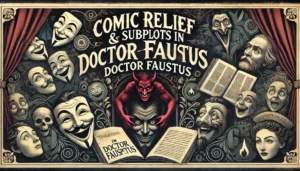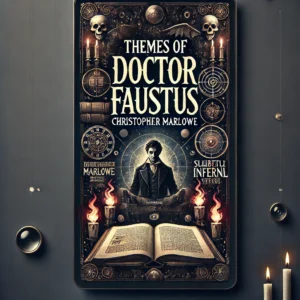Summary of Hamlet by William Shakespeare
William Shakespeare’s Hamlet is one of the most renowned tragedies in English literature, exploring themes of revenge, madness, corruption, and fate. Set in Denmark, the play follows Prince Hamlet, who seeks to avenge his father’s murder. Through Hamlet’s internal conflict and philosophical reflections, the play delves into questions of morality, existence, and human nature. This article explores summary of Hamlet by William Shakespeare.

Act 1: The Ghost’s Revelation
The play opens at Elsinore Castle, where guards encounter the ghost of King Hamlet, the recently deceased ruler of Denmark. The ghost appears to Prince Hamlet, revealing that he was murdered by his brother, Claudius, who has since taken the throne and married Hamlet’s mother, Queen Gertrude. The ghost commands Hamlet to seek revenge:
“Revenge his foul and most unnatural murder.” (Act 1, Scene 5)
Hamlet is deeply disturbed by this revelation and decides to feign madness to uncover the truth. His erratic behavior confuses those around him, especially Ophelia, the daughter of the king’s advisor, Polonius, with whom Hamlet has a romantic past.
Act 2: Hamlet’s Feigned Madness
Claudius and Polonius suspect that Hamlet’s madness is caused by love for Ophelia, but Hamlet’s behavior is calculated and enigmatic. He delivers his first great soliloquy, questioning the meaning of life:
“O, that this too too sullied flesh would melt,
Thaw, and resolve itself into a dew!” (Act 1, Scene 2)
To confirm Claudius’s guilt, Hamlet arranges for a group of traveling actors to perform The Murder of Gonzago, a play that mirrors the alleged crime. He hopes to provoke Claudius into revealing his guilt.
Act 3: The Mousetrap & The Consequences
During the performance, Claudius reacts guiltily and abruptly leaves, confirming Hamlet’s suspicions. Hamlet confronts Queen Gertrude, leading to the accidental killing of Polonius, whom Hamlet mistakes for Claudius.
This murder deepens Hamlet’s troubles, and Claudius, now fearing Hamlet, plots to send him to England with orders for his execution.
Act 4: Ophelia’s Madness & Hamlet’s Exile
Ophelia, devastated by her father’s death and Hamlet’s erratic behavior, descends into madness and ultimately drowns, an event that may be suicide or accident.
Meanwhile, Hamlet is sent to England, but he outsmarts Claudius’s plan and returns to Denmark. Claudius conspires with Laertes, Polonius’s son, to kill Hamlet in a rigged duel.
Act 5: The Tragic Ending
The play’s climax takes place in a graveyard, where Hamlet famously contemplates mortality, holding a skull:
“Alas, poor Yorick! I knew him, Horatio.” (Act 5, Scene 1)
During the duel, Laertes uses a poisoned blade, fatally wounding Hamlet. Queen Gertrude accidentally drinks poison meant for Hamlet and dies. In his final moments, Hamlet kills Claudius, fulfilling his revenge but succumbing to his own wounds.
With his dying breath, Hamlet entrusts his story to Horatio, urging him to tell the truth:
“The rest is silence.” (Act 5, Scene 2)
The play ends with the arrival of Fortinbras, the Prince of Norway, who takes control of Denmark, marking the tragic collapse of the royal family.
Conclusion
Hamlet is a deeply psychological and philosophical tragedy that explores themes of revenge, existential doubt, fate, and human frailty. Hamlet’s hesitation, Claudius’s scheming, and the tragic downfall of almost every major character illustrate the chaotic consequences of revenge and political corruption. The play remains one of Shakespeare’s most profound and widely studied works, offering timeless reflections on the human condition.
#summary of Hamlet by William Shakespeare #summary of Hamlet by William Shakespeare #summary of Hamlet by William Shakespeare #summary of Hamlet by William Shakespeare #summary of Hamlet by William Shakespeare #summary of Hamlet by William Shakespeare #summary of Hamlet by William Shakespeare
Read More
Legacy and Themes of Doctor Faustus
Comic Relief & Subplots in Doctor Faustus
The Role of Mephistopheles and the Devil Pact in Dr Faustus
Introduction to Dr Faustus and Marlowe
Classical Theatre and Classical Drama
Plot Construction in Pride and Prejudice
Introduction to Fiction and Non Fiction
Of Death — Francis Bacon (Text)
Of Truth Critical Analysis by Sir Francis Bacon
Of Truth by Francis Bacon Summary
Visit Us on our Facebook Page:






